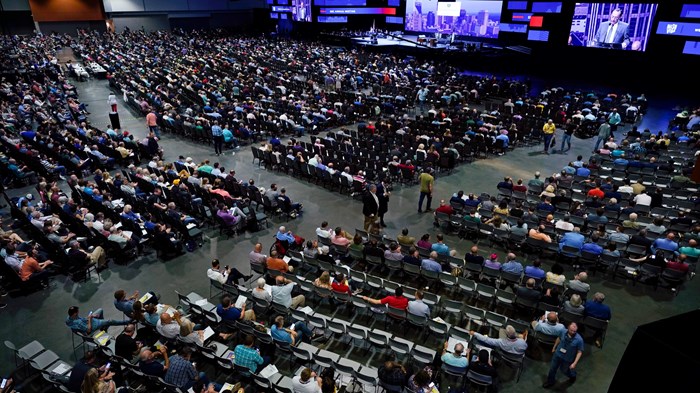
Pastor Adam Wyatt was driving to a hospital visit in southern Mississippi last month when he began crying angry tears.
“I usually don’t do that,” said Wyatt, who had stayed up late the night before to read through the devastating 288-page report on Southern Baptist Convention (SBC) leaders’ response to abuse.
“It’s been a long year.”
In June 2021, Wyatt was on his way to the previous SBC annual meeting in Nashville when he received a call to become the senior pastor of Corinth Baptist Church. By the time he left the meeting a few days later, he had another new title: Executive Committee (EC) trustee.
A second-generation Southern Baptist pastor with degrees from two SBC seminaries, Wyatt joined the EC—the decision-making body for day-to-day SBC business—just as scrutiny over its leaders’ response to abuse reached its pinnacle.
Wyatt was among the EC members who lobbied for the outside investigation to move forward with the level of transparency and accountability the convention had called for. Their efforts paid off. Guidepost Solutions issued 288 pages on EC leaders’ moves to dismiss survivors and reformers, and the EC released a hidden list of 700 pastors who’d been credibly accused of abuse.
Now, the Mississippi pastor is preparing for the SBC’s 2022 annual meeting, considered the most significant in a generation. Starting Tuesday, more than 8,500 Southern Baptists will meet in Anaheim, California, to decide what comes next: how to establish a process for reporting abuse, better policies for responding, and restitution for those harmed by SBC pastors.
In the wake of the revelations, the proposals once rejected outright by prior EC leaders as impossible due to denominational polity or liability are now top priority.
Yet advocates say it’s hard to celebrate the progress and momentum around addressing abuse when survivors had been requesting such changes for decades. When the uncaring response is something they should have never had to put up with in the first place.
And when any changes still have to be approved and enacted by a convention that has faced division and competing priorities in recent years.
After the convention made an unprecedented move to approve the outside investigation into the EC last year, Wyatt found himself thrust into the fight for transparency and accountability. He became closer with the survivors who had previously been stonewalled by EC leaders.
At the 2021 annual meeting, he met and talked with some of these women. “I had given them my word: ‘I’m going to fight for you as much as I can and try do what’s right,’” Wyatt said.
He remembered that promise months later when he was back in Nashville at Southern Baptist headquarters for his first EC meeting last September. He wasn’t prepared for the protracted debate and wave of resignations that erupted before the EC agreed to turn over confidential materials per the terms of the investigation.
While some in the meeting warned that the move would put the SBC at legal and financial risk, the head of the task force overseeing the investigation—a no-nonsense North Carolina pastor named Bruce Frank—repeatedly reminded the EC that that’s what the convention had asked them to do and that’s what would bring the truth to light.
Wyatt heard survivors seated behind him during the open meeting gasping and sighing while multiple sets of lawyers and the previous EC president, Ronnie Floyd, urged against waiving attorney-client privilege.
Wyatt said he got a glimpse of the uphill battle the survivors had endured. “I remember I asked, ‘Is this kind of how y’all feel? You try to do the right thing … and then you get so tired and frustrated by trying and not getting anywhere that it just grinds you into submission?’”
The Mississippi pastor spoke up in the meeting and in exasperated, GIF-filled Twitter threads. He was inspired by Jared Wellman—a veteran EC member who went from being a dutiful, quiet trustee to an outspoken voice challenging suspected coverup. Wellman said Augie Boto, the former EC executive implicated in the abuse report, had once told him, “You’re quiet, and I like that about you.”
“I kind of shiver at the comment now,” Wellman told CT. In the wake of the Houston Chronicle’s 2019 investigation into SBC abuse, he said, “I just went rogue, to be honest with you, which is completely outside my character.”
After the conflicts over the investigation in the past year—and the steady opposition survivors have faced for the past 15, at least—it’s hard to imagine the SBC messengers will be on the same page when making decisions in Anaheim.
Southern Baptists may have anticipated some of the divides over the Guidepost report’s findings, but unexpected issues have cropped up too. This month, the firm’s corporate Twitter account posted in support of gay pride. Now, vocal leaders are questioning whether a secular company with an opposing stance on sexuality is well positioned to advise the SBC on sexual abuse and complaining about denominational dollars going to a pro-LGBT contractor.
“Before this past week I was feeling good … now it’s just a whole nother fight we’re having to deal with,” said Wyatt.
The two likely leading candidates for SBC president fall on either side of the divide. Baptist historian and rural Texas pastor Bart Barber said while he is disappointed with Guidepost’s stance on pride, it doesn’t change the “absolute truth” of what its investigation uncovered. He worries about the incident being used to divert the judgment due on the SBC. Barber has spoken regularly about the SBC’s abuse response and was involved in the move in 2018 to oust Paige Patterson from leadership at Southwestern Baptist Theological Seminary over Patterson’s treatment of a rape survivor.
Founders Ministries leader and Florida pastor Tom Ascol, on the other hand, said he felt betrayed and that Guidepost’s recommendations should be redrafted. Ascol’s candidacy is endorsed by the Conservative Baptist Network, and he ran on a platform of #changethedirection, attacking the alleged liberal drift of the SBC, condemning critical race theory and championing the sufficiency of Scripture. He has backed reforms to make the EC more transparent but has criticized “more sweeping recommendations that could broadly transform the polity of the SBC.”
The task force appointed to oversee the investigation has a list of recommendations that will go before the convention, but Guidepost, survivors, and the EC each have their own lists too, and messengers will have the opportunity to make suggestions from the floor. SBC’s relief arm, Send Relief, has already designated $4 million in existing funding to back the recommendations, including $1 million in survivor care, meaning the reforms won’t need to pull as much from church giving.
“As important as the investigation is, what happens in Anaheim on recommendations as far as protecting people and caring for people is just, if not more, important,” Frank said.
The pastor of the multisite Biltmore Church in North Carolina, Frank didn’t make it to last year’s annual meeting. His house had flooded, so he and his wife, Lori, had to stay back. But the then-newly elected SBC president, Ed Litton, called afterward to ask Frank to chair a group of pastors, lawyers, and abuse experts to ensure the Guidepost investigation was conducted as requested.
Frank had mostly avoided denominational leadership, he said, but the task force felt like a worthy cause and one that hit close to home—his wife was a survivor of sexual assault—so he agreed. In addition to speaking at the EC meetings about the investigation, Frank met with the task force over several months to hear from survivors, consult with state conventions, work with Guidepost, and develop recommendations for the SBC.
He learned about abuse and abuse responses along the way. “I can say I was not informed,” Frank said. “I was familiar with, I was empathetic toward, but that’s different.”
Frank described his mixture of anger and sadness hearing survivors’ stories—feelings he said the Lord can shape into resolve.
Speaking from his church office in Asheville, the Southern preacher emphasized the importance of the abuse issue for all pastors. He kept repeating that the odds are that they have survivors in their congregations and one day they’ll get a call reporting an instance of abuse. If they aren’t trained to respond appropriately right away, he said, they’ll end up causing further hurt.
While Frank led the task force, he noticed that some in his own congregation outside Asheville began to see him differently. They thanked him for taking on the role. They made small comments in the lobby. “They won’t say it [outright], but they’ll say, ‘I grew up with that,’” he said. “That had never happened before.”
Christa Brown, a survivor whose steady advocacy and repeated rejections by the EC were documented in the Guidepost report, wanted to see swift change after the report but feels like she’s waiting for yet another gut punch with this year’s annual meeting.
Brown, who was abused by her Southern Baptist pastor at age 16, worries that the proposals before the convention are not immediate or robust enough to address the scope of the abuse problem. The task force overseeing the investigation, for example, recommends authorizing another task force to review potential changes and report back next year.
“After release of the Guidepost report, at a time when the task force should have pushed forward with full strength and vigor, instead it pulled its punches and made timid recommendations,” she told CT by email.
She’s disheartened to see the social media chatter among Southern Baptist pastors, including efforts to discredit Guidepost as well as complaints over the multimillion-dollar cost of the potential reforms.
Brown plans follow the news out of Anaheim from home.
“There’s the expectation that this would all come to nothing, or at least a fear that it will, and that’s not an unreasonable fear because that’s what’s happened every other time,” said Todd Benkert, an Indiana pastor and advocate for survivors. Last year, Benkert’s quick-thinking motion at the annual meeting prevented the EC from taking charge of its own investigation.
“I don’t ask survivors to trust me or the SBC or even to hope,” he said. “I just do what’s right and call other people to join me in that. Whatever role I have, I want to use it.”
Survivor Jules Woodson, a single mom and flight attendant, wasn’t in Nashville to see the wave of messengers hold up their ballots to approve the EC investigation last year. She has booked her trip to Anaheim and said she would like to be in the convention hall this year to see another historic moment when the convention will vote on the recommendations for reform, “because these are the things we’ve been pleading for.”
“Hope is a very sticky word with survivors,” she said, “but I want to feel some sense of acknowledgement, some sense of action.”
Woodson’s 2019 testimony in The New York Times kicked off the #ChurchToo movement; the pastor who abused her as a teen, Andy Savage, received a standing ovation for confessing to a “sexual incident” after Woodson shared her account online. Last month, Savage—who remains a pastor—was named on the EC’s secret list.
Brown and Woodson are among a group of SBC abuse survivors who released a joint statement recommending immediate action on key recommendations, including an independent commission to receive allegations, a database cataloguing credibly accused pastors, and funding for survivor care.
Over the past year, more Southern Baptists have come to see what SBC abuse survivors have seen all along. The investigation confirmed their accounts, and the aftermath is revealing something else they’ve known from the start: A problem this big necessitates significant change.
Days after his cry in the car, Wyatt said he realized that even with all the important work preparing for the 2022 annual meeting, “we’re not fixing this in Anaheim. This is a long-term culture-shift change.”
Wellman, who has been on the EC for seven years, says “in the least, it’s one of the most important conventions in the history of the convention. It might even be the most important.”
“If anyone’s walking into this excited, something’s wrong with them,” the Tate Springs Baptist pastor said. “It’s time to grieve, it’s a time to do business, and ultimately it’s a time to do business with the Lord.”
The thousands who will gather to pray, listen, debate, and vote in the Anaheim convention hall represent 13.7 million Southern Baptists. They’re the biggest denomination in the country but structured uniquely as a fellowship of independent churches who meet and cooperate for the sake of mission.
“We have to remember that people are the mission. We want to send missionaries to the end of the world, into the earth, absolutely. We want to plant churches. We want to have strong, healthy seminaries,” said Wyatt. “But protecting people is what pastors and shepherds and churches should do. So, whatever it takes for us to protect people better, that is clearly in line with what we’re supposed to do as Southern Baptists.”

Support Our Work
Subscribe to CT for less than $4.25/month


















